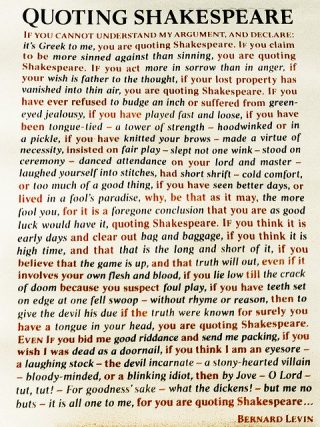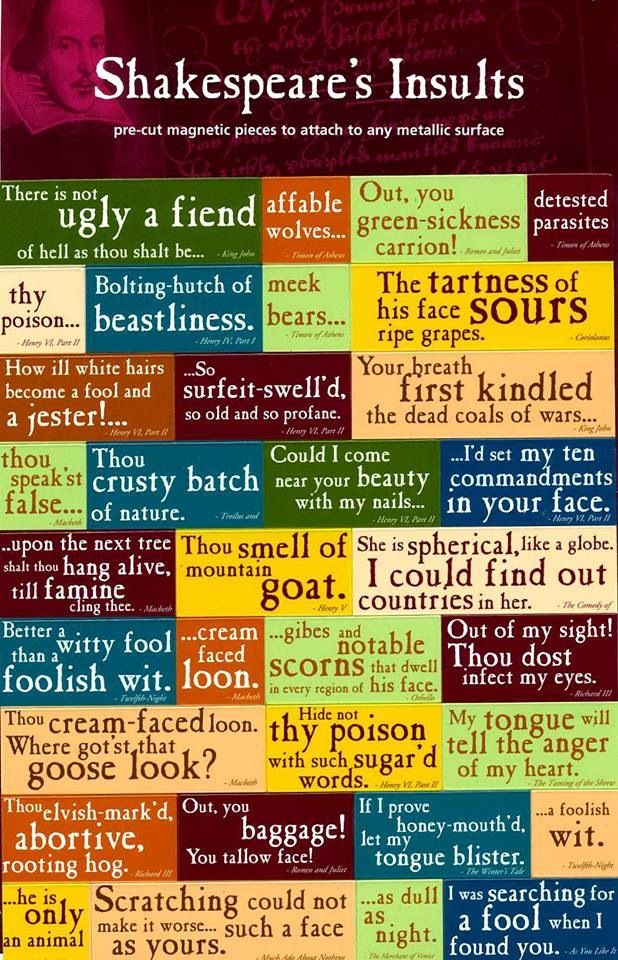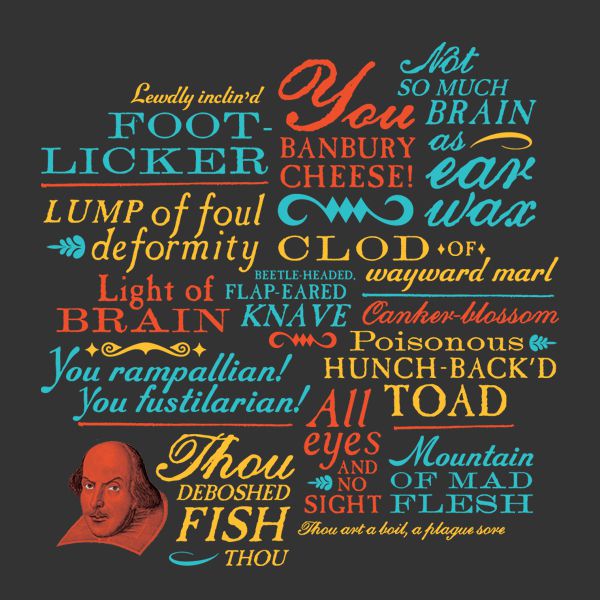 William Shakespeare is widely known for the famous lines “wherefore art thou Romeo,” “to be or not to be,” and “et tu, Brute?” easily recognizable to everyone. However, the Bard’s impact on everyday modern day English goes beyond memorable lines from widely-read/performed plays, Shakespeare coined so many new phrases, that over the years they have become pervasive in the English language.
William Shakespeare is widely known for the famous lines “wherefore art thou Romeo,” “to be or not to be,” and “et tu, Brute?” easily recognizable to everyone. However, the Bard’s impact on everyday modern day English goes beyond memorable lines from widely-read/performed plays, Shakespeare coined so many new phrases, that over the years they have become pervasive in the English language.
On Shakespeare’s 400 year anniversary, Welsh comedy actor Rob Brydon demonstrates with a Bernard Levin poem how Shakespearean phrases are so ingrained in our language that we can be oblivious as to when we are quoting him.
Quoting Shakespeare – By Bernard Levin
If you cannot understand my argument, and declare “It’s Greek to me”, you are quoting Shakespeare; if you claim to be more sinned against than sinning, you are quoting Shakespeare; if you recall your salad days, you are quoting Shakespeare; if you act more in sorrow than in anger; if your wish is farther to the thought; if your lost property has vanished into thin air, you are quoting Shakespeare; if you have ever refused to budge an inch or suffered from green-eyed jealousy, if you have played fast and loose, if you have been tongue-tied, a tower of strength, hoodwinked or in a pickle, if you have knitted your brows, made a virtue of necessity, insisted on fair play, slept not one wink, stood on ceremony, danced attendance (on your lord and master), laughed yourself into stitches, had short shrift, cold comfort or too much of a good thing, if you have seen better days or lived in a fool’s paradise -why, be that as it may, the more fool you , for it is a foregone conclusion that you are (as good luck would have it) quoting Shakespeare; if you think it is early days and clear out bag and baggage, if you think it is high time and that that is the long and short of it, if you believe that the game is up and that truth will out even if it involves your own flesh and blood, if you lie low till the crack of doom because you suspect foul play, if you have your teeth set on edge (at one fell swoop) without rhyme or reason, then – to give the devil his due – if the truth were known (for surely you have a tongue in your head) you are quoting Shakespeare; even if you bid me good riddance and send me packing, if you wish I was dead as a door-nail, if you think I am an eyesore, a laughing stock, the devil incarnate, a stony-hearted villain, bloody-minded or a blinking idiot, then – by Jove! O Lord! Tut tut! For goodness’ sake! What the dickens! But me no buts! – it is all one to me, for you are quoting Shakespeare.
From the poem it is clear not that even if we have never read any of William Shakespeare’s works or sat through a performance of one of his plays, it’s likely that we still unwittingly quote the Bard of Avon every day because the world-famous playwright is credited with coining or popularizing hundreds of words and phrases that remain a part of the contemporary lexicon.
 The Oxford English Dictionary credits William Shakespeare with the first-use citations of approximately 1,600 words—from “bedazzle” to “fashionable” to “watchdog”—more than by any other writer. The master of wordplay also contributed dozens of other phrases that remain a part of our everyday language. In some cases, Shakespeare may have coined the terms; in others he may have been the first to put them into the written record.
The Oxford English Dictionary credits William Shakespeare with the first-use citations of approximately 1,600 words—from “bedazzle” to “fashionable” to “watchdog”—more than by any other writer. The master of wordplay also contributed dozens of other phrases that remain a part of our everyday language. In some cases, Shakespeare may have coined the terms; in others he may have been the first to put them into the written record.
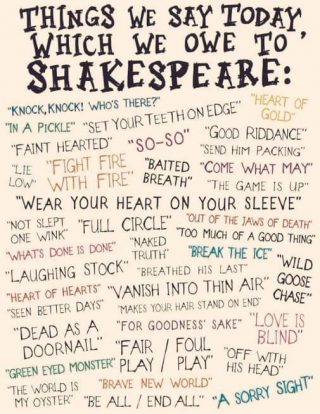 According to Stephen Marche, author of “How Shakespeare Changed Everything,” the playwright utilized various linguistic techniques to create new words. He anglicized foreign words, such as creating “bandit” from the Italian “banditto”; fused prefixes and suffixes onto preexisting words to craft new words and converted nouns to verbs, such as “to elbow” someone out of the way.
According to Stephen Marche, author of “How Shakespeare Changed Everything,” the playwright utilized various linguistic techniques to create new words. He anglicized foreign words, such as creating “bandit” from the Italian “banditto”; fused prefixes and suffixes onto preexisting words to craft new words and converted nouns to verbs, such as “to elbow” someone out of the way.
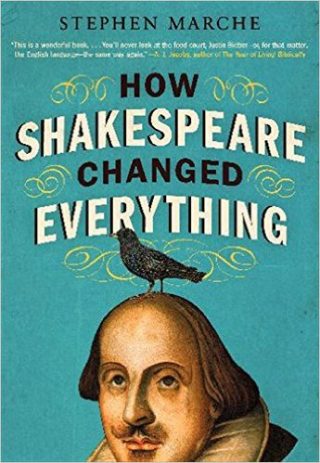 “Shakespeare had language and very little else to create effects,” Marche says. “He was the special-effects master of language. That’s why the language is so dense and intense.” The reason why so many of the bard’s words and phrases continue to resonate hundreds of years after his death remains one of literature’s great mysteries, according to Marche. “Is it just because Shakespeare was imposed on audiences for so long? Or is it something in the words themselves? It’s impossible to know.”
“Shakespeare had language and very little else to create effects,” Marche says. “He was the special-effects master of language. That’s why the language is so dense and intense.” The reason why so many of the bard’s words and phrases continue to resonate hundreds of years after his death remains one of literature’s great mysteries, according to Marche. “Is it just because Shakespeare was imposed on audiences for so long? Or is it something in the words themselves? It’s impossible to know.”
Source: http://www.history.com/news/10-ways-shakespeare-changed-the-way-you-talk
You are kindly asked to find at least three expressions that we owe to Shakespeare. Make sure you do not post the same as the ones of your classmates’. Use linoit (it looks like posts that you pin on a virtual blackboard). You can resort to the following websites to be inspired:
Now find out a few interesting things about the way Shakespeare contributed to the development of modern English. Create a few tricky questions to ask your classmates, a sort of competition:
http://www.nosweatshakespeare.com/resources/shakespeare-early-modern-english/
Now play a bit with the Shakespearean language. Write some interesting thought of yours, ideally prompted by the themes developed by Shakespeare in his plays, or by your interest for the Elizabethan playwright and see how he would have rendered your thought into English.
Post your contemporary version with the Shakespearean rendering. To do this you can resort to this webpage:
http://www.shmoop.com/shakespeare-translator/
or
https://lingojam.com/englishtoshakespearean (to have fun)
https://lingojam.com/shakespearean (to be more accurate)
What about Shakespeare’s insults?
“Thou art like a toad; ugly and venemous.”
– As You Like it.
You scullion! You rampallian! You fustilarian! I’ll tickle your catastrophe!
–Henry IV Part 2
Yes, there are no insults like the ones thrown around in grand fashion by the characters of Shakespeare.
Create your own insults, you are encouraged to. Hilarity ensues! Choose a classmate of yours with whom you want to “duel” using the insults. You say the insult. Your chosen classmate rebuts, using another insult back. Make sure you know what the insult means and possibly how you would render it in Italian or contemporary English.
The Ten Best Dad Jokes in Shakespeare
A dad joke is any joke that’s so terrible it elicits groans and ruins lives. It need not originate from a dad, per se, but the common cultural understanding is that most of them do. You’ll find them in wedding speeches, rogue Facebook comments, and conversations in line at the hardware store. From there they pervade the very fabric of our society so that even the best of us, dad or not, feel compelled to hit every “I’m bored” with a “Hi bored, I’m Dad.”
This is how the Independent announced the celebrations for Shakespeare’s 400th anniversary:
23 April, 1616. A man died, but a legacy was born; one which proved so essential not only to the development of drama and literature, but to language, to thoughts and ideas. To how we profess our love to each other, and to how we express our grief; his influence pervades so much in our lives, because his work has become so timeless in its ability to touch upon human nature.
This year marks the 400th anniversary of Shakespeare’s death; an event which has brought an appreciation to all edges of the cultural sphere. From television to film, theatre to classic music; the simple breadth and variety of the events being held in his honour speak to magnitude of his influence.
Do you find this effective? Why (not)? What specifically catches your attention?
Watch the following videos. What else do they add about Shakespeare’s capability of forging a new language?
Look at how the UK celebrated Shakespeare for his 400th anniversary:
From television to film, theatre to classical music; here are just some of the innovative, exciting events happening in honour of the Bard’s work
Imagine you were Shakespeare. Which of the following events would you find the most thrilling or the one that best represents your genius and say why. Is there any other way you would have celebrated the great playwright? If so, share it with us. (leave a comment in the space provided below)
TELEVISION
BBC’s Shakespeare Festival will host an entire season of adaptations and interprations of the Bard’s life and work. Ben Elton has penned new sitcom Upstart Crow for BBC Two, which sees David Mitchell play a nerdy take on the poet opposite Harry Enfield as his father. The channel will also air the concluding instalments of The Hollow Crown, starring Benedict Cumberbatch and Judi Dench, which works as an adaptation of his History plays.
LONDON
The Globe’s utterly innovative event The Complete Walk will see the banks of the Thames erupt with life between 23-24 April; as 37 screens across a 2.5 mile route between Westminster and Tower Bridge will play individual 10-minute films, each exploring a particular aspect of his work. Featuring globally-renowned actors, the pieces will be feature international locations; from Cleopatra in front of the Pyramids, to Hamlet on the rocks of Elsinore.
The British Libary hosts a special exhibition entitled Shakespeare in Ten Acts; which explores his establishment as a cultural icon through 10 key performances, including the display of the only surviving play-script written in Shakespeare’s hand.

